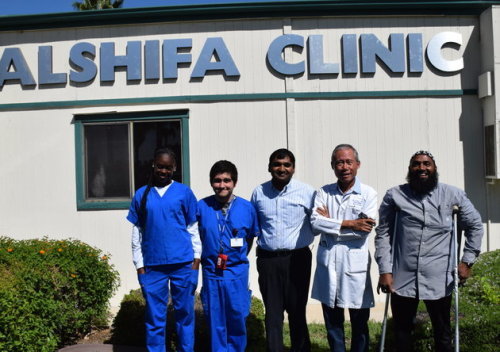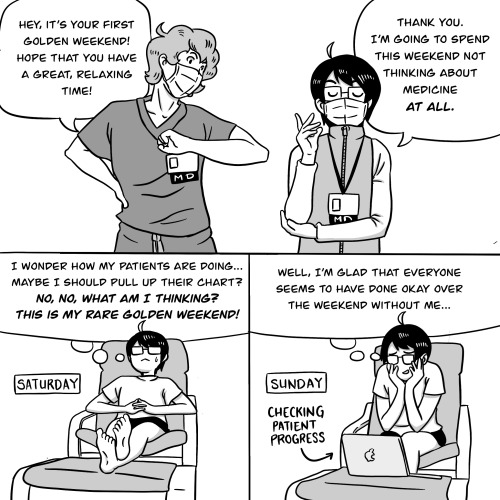#physician
This Muslim Clinic, Treating Mostly Latinos, Is What ‘Makes America Great’ Already
Al-Shifa Clinic relies on volunteer doctors to donate their time to serve all people, many uninsured or under-insured, free of charge. This is what compassion looks like in action.
Let’s support these wonderful folks and combat the hate aimed at people of Islamic faith following Trump’s election as President.
Post link
Vancomycin is a powerful antibiotic that we use frequently in the hospital. However, of its main side effects is kidney damage. In patients who already have very bad kidney function, vancomycin can push them over the edge, into acute kidney injury (AKI) or end-stage renal failure (ESRD). For particularly sick patients, there may not be a good alternative to vancomycin, so the medicine team and I have to weigh the pros and cons carefully.
Post link
Rarely, interns enjoy ”Golden Weekends,” during which we have both Saturday and Sunday off (which normal people just call “the weekend”). As much I try not to think about work during my days off, my mind always seems to wander back to my patients.
Post link
For everyone entering or returning to school, welcome back and I am officially back!
What I am about to go over is basic stuff today, but it seems we all get a bit lax with and I feel review for us all is important at this time.
Patient assessment falls on the back steps at times. It is key for our jobs as medical professionals, but quickly forgotten when we use to our tools. We get tunnel vision at times and treat what we hear. This is true of EMTs, Nurses, PAs, NPs, MDs and any others.
Chest pain usually means the following things
- Vitals
- EKG
- Labs
- Chest X-ray
- IV/IV fluids
- Nitro
- ASA
We as providers are trained to think heart attack first. While it is good to put this in your differentials, it’s not always good to jump the gun to it either.
Doorway Impression
A doorway impression is simple that. When you walk in, what do you see?
If you’re in the hospital, how they got to their room, where they sit, how their physical appearance is can all be clues. While we shouldn’t judge, seeing an obese male in his 60’s with a pack of cigarettes in his pockets, you can probably put cardiac related issues in the “possible” pile.
If you see a 20-year-old college student who appears in shape that is curled up with his knees to his chest and taking rapid shallow breaths, your first opinion might not be cardiac, so it should shift in your list possible Dx.
That first impression won’t give tell you what it is most the time, but it might have a few clues.
ABC’s
If these weren’t pounded into your skull in medical school at any level, we need to chat later.
Airway, breathing and circulations are easy tools and tell you a lot. I will throw in their mental stats here as well.
If they are talking with you, their skin is warm dry and pink, and pulses are strong regular-regular radial; It’s safe to assume that they probably aren’t having a major issue at the moment. Their airway is patent, breathing appears unlabored and after some auscultation lungs to be clear to be sure. Strong pulses that are regular-regular is helpful. Skin condition tells you they’re probably not in shock.
You walk in to a patient that is pale, diaphoretic, barely able to get a few words out, before taking gasping breaths. That alone should tell you something is up. Airway may be patent, but breathing obviously isn’t good. Lung sounds might present with wheezing, which will give you the impression of allergic reaction or asthma attack. When do feel a pulse, is it bounding or stringy might give you a bit more information. This is all just from assessing their ABC’s.
Now, if they are not breathing and there is no pulse, for the love of god, start CPR!
Patient history
Time to get the story down. There is a lot to ask the patient, start with why they seek medical attention at this time. What is the chief complaint.
You’ll then go through you OPQRST and SAMPLE. Ask you these questions, you can add things that may assist in leading you toward what is going on with them. Remember not get tunnel vision when you find a single detail, but try having some solid follow up questions.
Tip: try to have the describe things. Don’t give them a lot of “yes” or “no” questions.
Vitals
Vitals can say a lot and pending where you work, they maybe be done early on in your assessment process and that is perfectly fine. They will play a role in determining if your patient is stable or unstable, but this can still determine early without vitals.
Testing
Now you can get their testing, but with it won’t be just chest pain now. You might be looking for an MI, but PE. There maybe be a bruise on that 20-year-old chest from when he got hit with a bat three days ago. You patient that came in with difficulty breathing might have a Hx of COPD and today just got worse.
Test should be done here to assist with further Dx of the pt. This is where you do your EKG, BG, X-rays, and everything else.
Final Notes
Diagnosing a patient is more than a few tests when related to a chief complaint. It is a series of steps that require you as health care provider to look at and break things down. The list above is not a steadfast list either, it is a general outline that we should all look at as the basics.
Ultimately, how you perform these steps pends on how you work and the way you develop your questioning habits. The major point of this is that we need to get past our labs, ekgs, x-rays, TCs and other toys. We need to look at the patient first and ask ourselves what are all the possibilities and then begin looking through out differentials and picking our exams from there.
Written by: MedDaily
DWPA - death with paramedic assistance
And if you want to pay a little extra for it - death with physician assistance
pediatric sedation!!! all the weapons in your arsenal (so to speak)
download my med school study guides here
Post link
Starting clinical rotations can be overwhelming. If you’re like me, you may spend the first days stressing about where you should go, what questions are legit to ask and how you should behave. Most of the time you may have no idea of what your superiors are talking about and you just fake a smile and pretend you know exactly what you’re doing. Meanwhile it’s totally normal to feel lost during the first days of your arrival in a new care unit, it shouldn’t last and you should be able to get more comfortable with the team you’re working with and become more autonomous. Here’s how to get the most of your clinical rotations:
- ALWAYS introduce yourself when meeting with a new team : it will always be appreciated and people should be able to reach out to you if they need it
- TAKE NOTES and always keep a little notebook in your pocket! I actually own 3 (yes it may be a bit excessive) : one for patient’s history, one for personal notes and another one for definitions and scores
- Ask for feedback. The resident you’re shadowing may not necessarily think about giving you a feedback, or maybe he won’t pay enough attention to what you’re doing, and that’s why it’s better if you ask specifically for a feedback, especially when completing a task that you’ve been asked to do.
- If there’s a « down » moment when you don’t have anything to do, ask if there’s something you can do for help, even to other members of your team. Don’t hesitate to reach to the nurses or the other medical staff and ask for some teaching! I once spend an entire day with the nurses of my unit so I could learn how to properly draw blood.
- If there’s really nothing to do, use this spare time to study a specific subject, and ask your resident if you can present it to him : not only it forces you to study a subject, but you’ll also be able to actively recall it better
- Before seeing any patient alone, make sure you went through his medical history so you already know if there’s a specific topic you have to investigate more : be prepared for questions from your assigned residents/physicians!
- MAKE THE CALLS. I know, I know, making phone calls is SUPER SCARY (especially when you have to call chiefs and professors). However, I like to say that it’s like running : the more difficult it is, the more you should do it. Prepare what you have to say so you don’t loose yourself during the call, and force yourself to make the phone calls as often as possible. You’ll gain more and more confidence and you won’t be so scared anymore.
- NEVER be late.
- If you feel there’s something wrong (with you of with a situation) : talk to your assigned resident/physician. They know how overwhelming it can get, so don’t hesitate to reach out for help
- Bring snacks. And a big water bottle. Avoid drinking too much coffee.
- Being a medical student has many good sides : you can get a first hand-on experience with patients without huge responsibilities, it is the BEST time to make mistakes and ask « silly » questions ! If you don’t do this during this time, you won’t be able to do it later.
- Most of the time, you’ll feel like you know nothing, and you’ll forget about things you learned the day before. It’s normal. Don’t be too hard on yourself.
- Be patient. And LISTEN.
- ENJOY YOUR TIME ! Be curious about everything, make new friends, talk with your patients, see as many things as you can, because this is the only time where you can get all these possibilities!!





